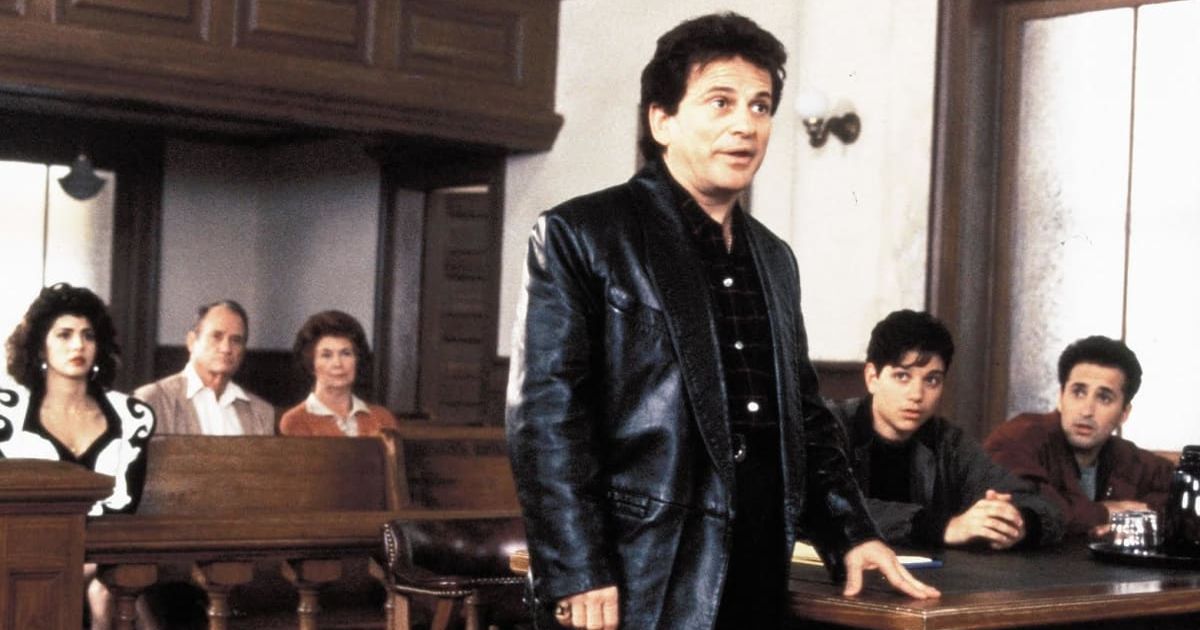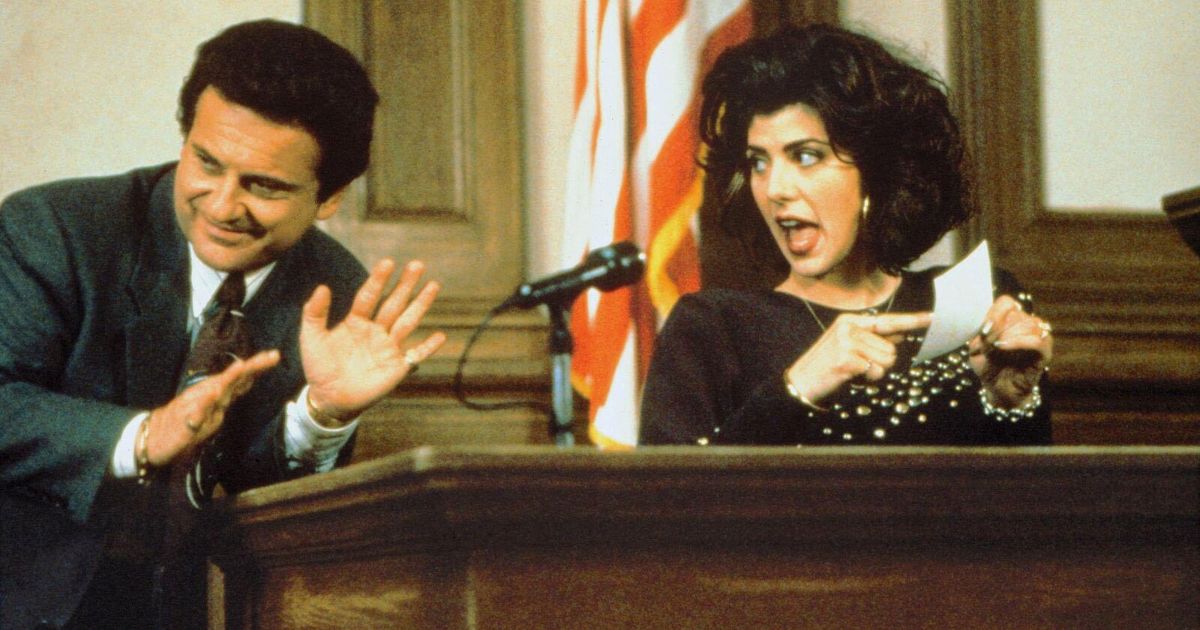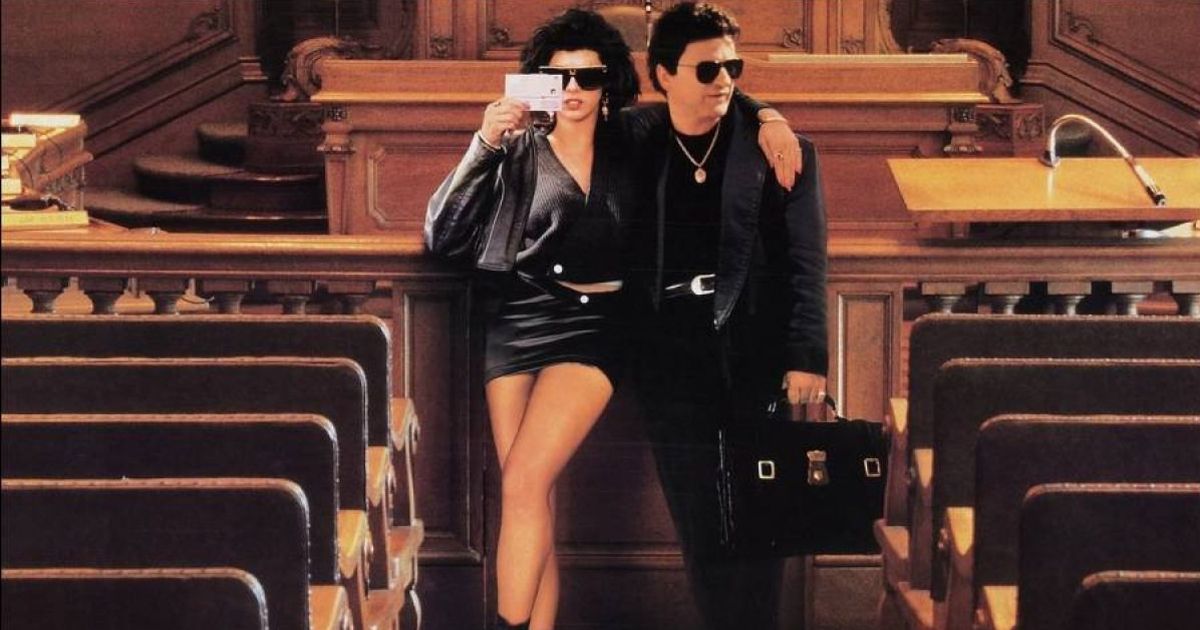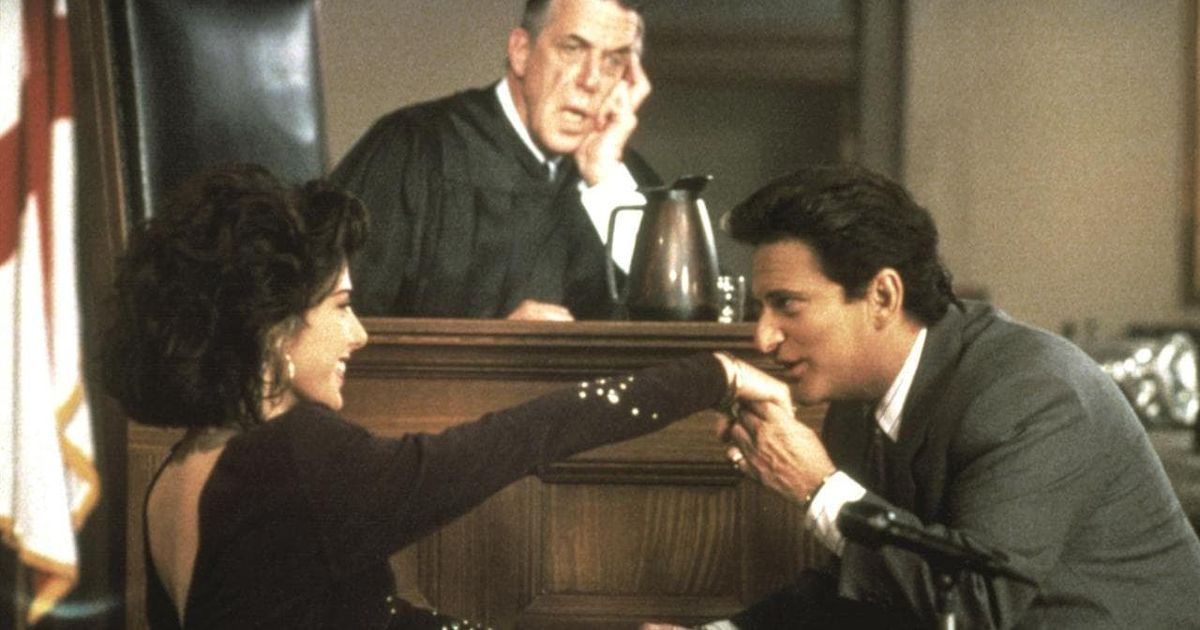Directed by Jonathan Lynn from a screenplay by Dale Launer, My Cousin Vinny was released in March 1992. The critically acclaimed and commercially successful courtroom comedy follows the unlawful arrest of Bill (Ralph Macchio) and Stan (Mitchell Whitfield), two New Yorkers wrongly accused of murder while passing through Alabama. With few options to turn to, Bill recruits his cousin Vincent LaGuardia Gambini (Joe Pesci) to represent him and Stan in court, despite lacking experience in a murder trial and generally having no clue what he's doing.
Equal parts a fish-out-of-water story and a romantic comedy, My Cousin Vinny won a controversial Academy Award for Marisa Tomei's outstanding performance as Mona Lisa Vito, Vinny's strong, sassy, and supremely intelligent girlfriend who helps him defend Bill and Stan in the court of law. Indeed, it's precisely the courtroom action and legal drama that takes place in the film that, in retrospect, has led to the film ranking among the all-time greatest law movies on record. For those who remain unconvinced, here's why My Cousin Vinny should be considered among the greatest legal dramas ever made.
Highly Educational
The first reason why My Cousin Vinny deserves to rank among the best courtroom dramas is how educational it is from start to finish. When Vinny is introduced, he claims he has experience as a personal injury lawyer. However, when pressed to reveal his record, Vinny states he's never actually won a court case and has zero experience representing a client in a trial, much less one as high stakes as a murder trial. As far as the legal process is concerned, Vinny is utterly clueless when the movie begins. Vinny is even oblivious to things as simple as a dress code and using lean language in a court of law.
As the film unfolds, great efforts are made to educate the audience about the confusing legalese as Vinny continues to study and improve his own understanding of the law. By vicariously educating viewers about the basics of courtroom procedure through Vinny's own learning process, almost everyone comes away with a much better grasp of how murder trials operate. The movie slowly holds viewers' hands and walks them through the fundamental aspects of courtroom procedure, culling nuggets of truth about the process as Vinny finds his bearings and figures out how to win the case.
Courtroom Procedure
Speaking of the courtroom procedure in My Cousin Vinny, it's worth noting that director Jonathan Lynn holds a law degree from Cambridge (via Abnormal Use). Due to Lynn's own sharp legal mind, the movie has been praised for the detailed legal procedure featured in the film, which allows Vinny to find his way and enables the viewers to understand the granular process that many law movies skip, gloss over, or take for granted.
For example, Vinny is held in contempt of court several times by Judge Haller (Fred Gwynn) for lacking courtroom decorum, failing to cross-examine a witness in a preliminary hearing, and is even fired and replaced by a pro bono public defender. According to the legal textbook A Guide to Forensic Testimony As an Expert Technical Witness, the authors explain how My Cousin Vinny is an "Entertaining [and] extremely helpful introduction to the art of presenting expert witnesses at trial for both beginning experts and litigators." Supporting the sentiment, Paul Bergman's essay, "Teaching Evidence the 'Reel' Way" cites My Cousin Vinny as an example of demonstrating such courtroom procedures as the rules of evidence, cross-examination, relevance, and voir dire. In addition to learning in stride with Vinny in the popular '90s comedy, the movie makes the legal process easy and accessible to understand.
Legal Accuracy
The chief reason why My Cousin Vinny is the best law movie is its airtight legal accuracy and authenticity. According to lawyer Max Kennerly in his essay "Every Young Lawyer Needs to Watch My Cousin Vinny" (via Litigation and Trial), "The movie is close to reality even in its details. Part of why the film has such staying power among lawyers is because, unlike, say, A Few Good Men, everything that happens in the movie could happen - and often does happen - at trial."
One of the most authentic courtroom moments in the movie involves prosecutor Jim Trotter suddenly bringing out FBI analyst George Wilbur as a surprise witness, forcing Vinny to object to no avail. Another entails Vinny using the cultural knowledge he's gained at a local Alabama diner to question a witness' testimony regarding the time it takes to cook southern grits. Perhaps the best example includes Mona Lisa poring over photographs she missed the first time around and spotting a damning piece of evidence. This sense of accuracy is supported by prominent American Judge Richard Posner, who declared that My Cousin Vinny "is particularly rich in practice tips: how a criminal defense lawyer must stand his ground against a hostile judge, even at the cost of exasperating the judge." (via Law & Literature).
Cross-Examination
Thanks to his time on task and Mona Lisa's expertise, Vinny becomes more adept at cross-examination as the quotable '90s film unfolds. For instance, when Vinny cross-examines George Wilbur, he gets the FBI witness to admit that the tires on Bill and Stan's car are the most popular in the world, thereby reducing their chances of guilt. It's precisely Vinny's methodology that has led some of the brightest legal minds in America to agree that My Cousin Vinny stands head and shoulders above most courtroom dramas.
According to U.S. Federal Judge Joseph F. Anderson in his work "Ten Things Every Trial Lawyer Could Learn From Vincent LaGuardia Gambini," Vinny's courtroom tactics are "a textbook example" of Irving Younger's "10 Commandments of Cross-Examination" and especially praised the role of an expert witness testifying in a federal case. Anderson wrote that Lynn and Launer "Have given our profession a wonderful teaching tool while producing a gem of a movie that gives the public at large renewed faith in the common law trial and the adversarial system as the best way to determine the truth and achieve justice." Even the current U.S. Attorney General, Merrick Garland, publicly stated, "In 1992, Vincent Gambini taught a master class in cross-examination" (via UScourts.gov).
Anti-Death-Penalty Stance
While it's one thing to hear from the leading legal minds in the country, it's quite another to hear from the filmmakers themselves. According to an interview by Abnormal Interviews, director Jonathan Lynn believes that a large part of the movie's appeal has to do with his stance against the death penalty, which is neither preachy nor pedantic. Lynn also believes that lawyers love the movie because, unlike his 1997 legal farce Trial and Error, "there aren't any bad guys." Even the judge and prosecutor who oppose Vinny genuinely seek justice, which gives the movie a high replay value.
In the interview, Lynn claims he and Launer sought to make the legal procedure in My Cousin Vinny as accurate as possible, comparing it favorably to the absurdity of Trial and Error, a movie that nobody has ever accused of being the best law movie ever made. In addition to the movie's advocacy and authenticity, Lynn also states that he believes the distinction between unreliable eyewitness testimony and reliable expert witness testimony is why My Cousin Vinny has withstood the test of time.
The Humor & Performances
It's impossible to discuss the lasting merits of My Cousin Vinny without mentioning the powerhouse performances by Pesci and Tomei and the laugh-out-loud hysterics that ensue. The comedic timing and sizzling onscreen chemistry between Pesci and Tomei is an absolute delight to behold, with the culmination of their break-up-and-make-up taking place in court as they solve the case together serving as one of the screenplay's highlights.
While it's no surprise Pesci gives such a hilarious turn after showcasing his comedic chops in Goodfellas and Home Alone, it's Tomei's revelatory tour-de-force in the movie that really deserves the most praise. Tomei famously experienced blowback after winning what many believed at the time was an undeserving Oscar for Best Actress in a Supporting Role. Over time, Tomei has been vindicated for her hilarious and heartfelt performance in My Cousin Vinny as an undeniable strength of the movie. With lesser performances built around Vinny and Mona Lisa's humorous rapport, the movie would be remembered far less fondly.
Legacy
In addition to Tomei's Oscar victory, the lasting legacy of My Cousin Vinny solidifies its spot as the preeminent legal drama. In 2008, the legal publication ABA Journal listed My Cousin Vinny as #3 on their list of the "25 Greatest Legal Dramas." In 2010, the same journal named Vinny Gambini as #12 on their list of the "25 Greatest Fictional Lawyers (Who Are Not Atticus Finch)."
In 2012, Launer wrote a screenplay for a My Cousin Vinny sequel, which involved Gambini practicing law in the U.K. Tomei was initially attached to the project but dropped out. When a new writer was brought in to create a story without Mona Lisa Vito, the project was ultimately shelved (via Abnormal Interviews). In 2017, novelist Lawrence Kelter began a series of books featuring Gamibini taking on contemporary cases with Mona Lisa as his investigator. After his first novel Back to Brooklyn, Kelter novelized the events seen in My Cousin Vinny. The latest entry, entitled Wing and a Prayer, was published in 2020. The fact that a movie sequel was attempted 20 years later and a novel series was created 25 years after its release should tell fans everything they need to know about the staying power of My Cousin Vinny as the best law movie ever made.







Comments
Post a Comment